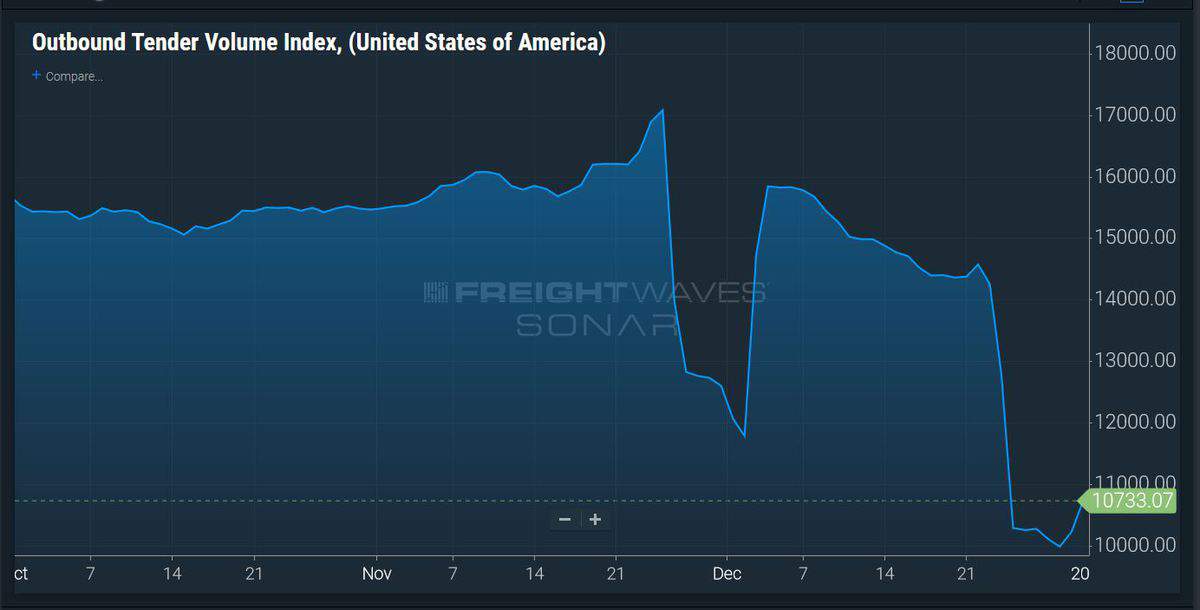TravelCenters of America (NASDAQ: TA) sold a lot more diesel in the fourth quarter of 2020 than it did in the corresponding quarter of the prior year.
In fact, it sold more diesel in the fourth quarter than it has in any other quarter in recent years. Diesel sales came in at a whopping 492.67 million gallons, compared to 423.9 million gallons in the fourth quarter of 2019.
The fourth-quarter 2020 number dwarfs any recent numbers recorded by the company. For example, diesel volume sales for TA in the second and third quarters of 2018, the most recent robust freight market, were 413.4 million gallons and 408.4 million gallons, respectively.
The high level of diesel sales was reflecting the volumes moving over the roads as seen in FreightWaves’ Outbound Tender Volume Index, which entered the quarter at a high level and stayed there except for the normal seasonal declines around Thanksgiving and Christmas.

But as an indicator that size alone does not matter, and the fact that TA’s bottom line is impacted by gasoline sales as well as diesel demand, TA’s adjusted gross fuel margin declined to $70.6 million from $77.4 million in the fourth quarter of 2019, a drop of 8.8%. The adjusted fuel gross margin per gallon declined to 12.7 cents from 15.6 cents, an 18.6% drop.
Gasoline sales dropped to 63.2 million gallons from 73.3 million gallons in the fourth quarter of 2019.
The drop in margins can also be seen in the raw revenue and expense numbers. Fuel revenues at TA declined $231.4 million between the fourth quarters of 2019 and 2020. But the cost of acquiring that fuel declined just $83.7 million. Revenues for the fuel TA sold were declining faster than the money it was laying out to acquire that gasoline and diesel.
In a prepared statement accompanying the earnings release, Jonathan Pertchik, the company’s CEO, said TA’s earnings suffered from “low volatility in the diesel fuel wholesale market, which unfavorably impacted fuel gross margin per gallon.”
Pertchik said the current margins in the market “may continue to create challenges going forward.”
The end result was a net loss of $7.1 million for the quarter, compared to net income of $43.1 million last year. The adjusted net loss of 28 cents per share actually beat analyst estimates by 9 cents, but the GAAP loss per share of 42 cents missed consensus by 38 cents, according to SeekingAlpha.
Revenue of $1.29 billion beat consensus estimates by $80 million, according to SeekingAlpha.
TA’s stock price had ridden down with the rest of the market during the day Thursday, declining almost $2 to close at $28.97, a drop of 6.43%, far exceeding the 2.5% decline of the S&P 500. TA stock continued to fall after the close, according to Barchart, down an additional 1.6%.
TA’s earnings also suffered from a decline in restaurant earnings, as some full-service restaurants remained closed or operating under restrictions. Restaurant revenue declined to $75.1 million from $107.9 million, while other nonfuel revenues were mostly higher. But the nonfuel margin dropped to 61% from 61.3% on the back of the restaurant decline.
TA is in the midst of a total makeover under Pertchik. Its balance sheet at the end of the quarter carried cash and cash equivalent of $483.1 million. A year ago, it was about $17 million. But a $200 million term loan agreed to in December fattened up the company’s capital structure.
With net income figures weak, Pertchick in his prepared statement chose to focus on adjusted earnings before interest, taxes, depreciation and amortization (EBITDA), which was up 36.1% from the fourth quarter. But for the category of EBITDAR — EBITDA plus restructuring costs — earnings increased 9.6% from the fourth quarter of 2019.
More articles by John Kingston
BMO’s transportation sector numbers tell story of stronger trucking market
That’s a record: Weekly DOE/EIA diesel price up 16 straight weeks
Diesel prices climbing in spot, wholesale and retail markets











